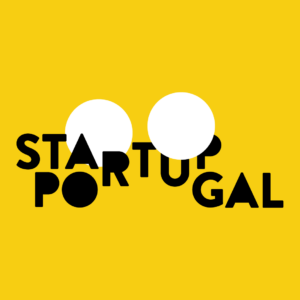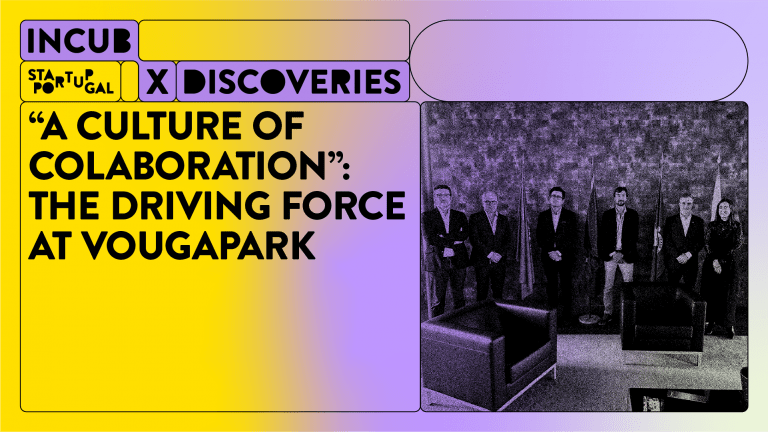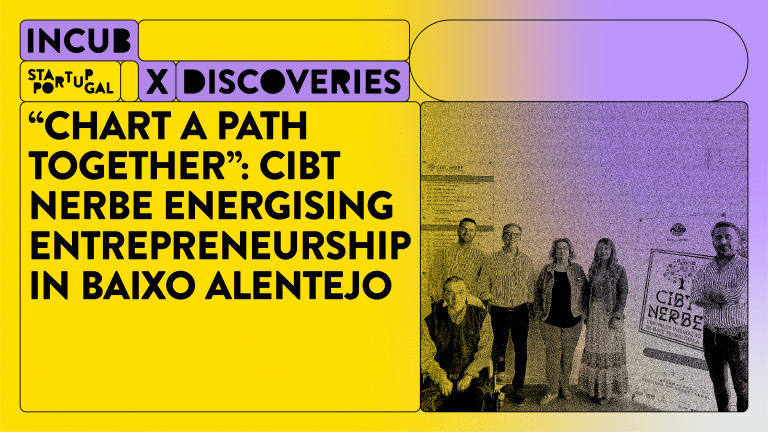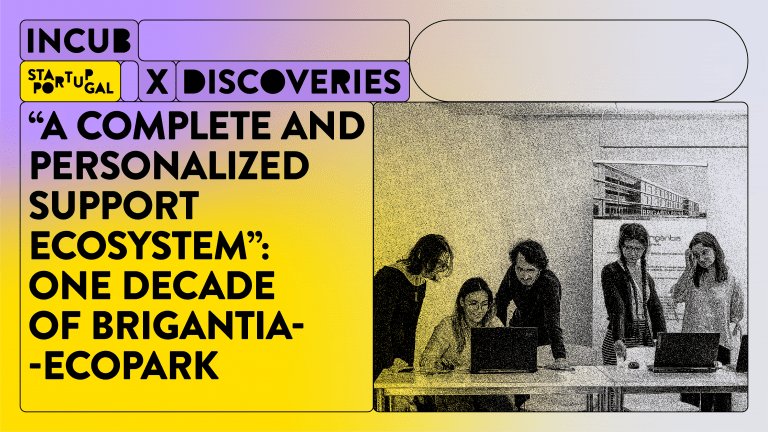“Where you can breathe innovation”: one day at TERINOV
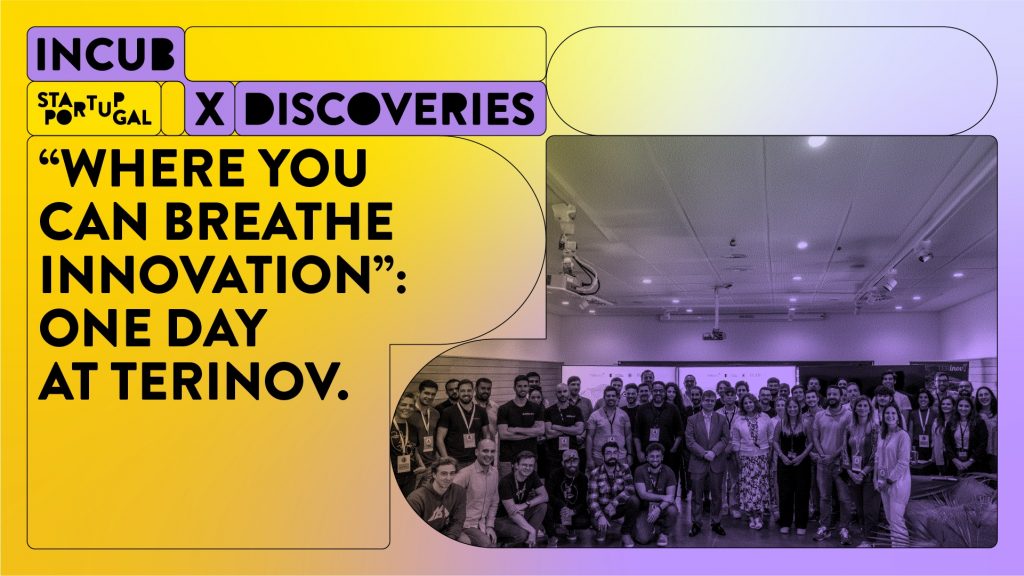
The Azores, besides their natural beauty, are also home to groundbreaking innovation and entrepreneurial spirit. At the heart of the Atlantic, Duarte Pimentel, TERINOV’s Executive Director, explains to us what are the driving forces behind this Science and Technology Park and its incubator.
This content is available in Portuguese.
– How did TERINOV come about? What kind of projects do they incubate?
TERINOV is the result of a commitment by the Government of the Azores, in close collaboration with the Angra do Heroísmo Chamber of Commerce and Industry. The TERINOV incubator is positioned as an infrastructure to support innovative activities based on a logic of knowledge and technology transfer, offering a unique ecosystem with high added value that aims to boost the business competitiveness of the Azores. The TERINOV ecosystem currently hosts a total of 78 projects, of which 71 are of a business nature (i.e. 24 in the coworking program, 37 in the physical and virtual incubation programs and 10 in the business development program) and 7 entities of a scientific nature, bringing together around 290 qualified professionals.
– What does your incubation model consist of?
TERINOV offers three programs to support business development, focused on different stages in the development of startups and entrepreneurs. Firstly, our Co-work Program targets researchers, independent professionals and projects in the very early stages, i.e. the pre-incubation stage. We believe that our ecosystem and infrastructures offer projects a set of assets and opportunities that can make a decisive contribution to the success of the business idea.
We then have the Incubation Program, aimed at formally constituted startups, no more than 3 years old, which requires physical installation in our incubation spaces. Its aim is to create physical conditions and offer favorable services so that projects can be developed in a sustainable way, regardless of the stage they are at.
Finally, we have the Business Development Program, which is designed to strengthen support for companies that are already established in international markets or are starting internationalization projects. This program closes the incubation cycle, making it possible to support entrepreneurial initiatives during the different stages of difficulty. TERINOV’s role within this program is to provide services that support the development of new products and services. These services include privileged access to R&D activities, through the Park’s own facilities, and support and accompaniment in accessing specific funding opportunities.
Both the Incubation and Business Development Programs are also available in virtual modalities, which replicate the physical programs, with a special focus on the immaterial and intangible benefits of being part of the TERINOV ecosystem, without needing to be present in the Azores.
– Can you tell us the story of a startup that made a difference in the incubator?And where has incubating with you made a difference?
It’s not easy to identify just one, as we are fortunate to have a very diverse entrepreneurial ecosystem with reference projects in all our areas of specialization. I must, however, highlight companies like Redcatpig, in the video games industry, which at the beginning of its journey won PlayStation Talents and has built a path of enormous success, being one of the members of the founding consortium of eGames Lab, funded under the PRR, whose objectives are to create a national cluster for the production and development of video games, stimulating and boosting the entire creative industries sector.
Another startup I would highlight is Wizardsardine, recognized on the international scene as one of the leading startups when it comes to developing Bitcoin security products. They have a complete custody solution using smart contracts, which offers, for example, manual “veto” on outgoing transactions and the mitigation of physical threats, without the need for third parties, and they have also developed a state-of-the-art Bitcoin wallet that includes inheritance solutions, more secure backups and more secure enterprise multisig with recovery features. It also stands out for its ability to break down any geographical barriers, proving that it is possible to work from the Azores to the world, and taking a serious stand in the global market.
We believe that the main advantages of setting up in TERINOV are the privileged access to a number of differentiating assets, such as the Azorean tax regime, access to specific regional financing mechanisms, physical proximity to knowledge centers and research units, plus integration into a highly dynamic technology-based business ecosystem, where you can breathe innovation and where synergies arise naturally and spontaneously, boosting the development of new ideas, services and products with high added value.
– Failure is also part of the journey. What’s the biggest learning from something that didn’t go well?
Acceptance of failure is as much a part of the entrepreneur’s mindset as incubator management teams, and is, or should be, frankly assumed to be an inherent part of the process. Acceptance of failure or error encourages entrepreneurs to set ambitious goals without fear of judgment. Instead of failure being seen as a personal or professional failing, it should be seen as a natural and necessary part of the entrepreneurial journey.
I truly believe that failure provides invaluable learning experiences, offering insights that successes cannot. Each failure, each setback, each failure, presents an opportunity to evaluate what didn’t work, why it didn’t work, and allows us, in an organic way, to understand how to avoid similar mistakes in the future. I also believe in the importance of what is known as the “fail fast principle”, and in this case “failing fast” is not just about accepting failure, it’s also about failing in a way that facilitates accelerated improvement.
In our case, a few years ago we made a very significant bet on an acceleration program for the agro-industry, a program with an international matrix that for various reasons (we can see that Murphy’s Law does exist) fell far short of expectations. These are the moments when we learn and understand, sometimes “the hard way”, the need to fail quickly and adjust course, while trying to take the most positive things from the failure and enhance those aspects and lessons learned.

– What is your incubator’s differentiating factor? In other words, what is it about you that uniquely enhances the success of the startups you incubate?
I think what makes us stand out is essentially our follow-up, monitoring and absolute belief in continuous improvement. Implementing a system to monitor and evaluate the progress of the startups in our ecosystem has been essential for identifying areas of strength and improvement, allowing us to track key performance indicators and make support decisions based on data.
Regular follow-up supported by feedback sessions has been fundamental to our ability to assess the effectiveness of our programs and make the necessary adjustments. This proximity approach has allowed us to leverage our incubation ecosystem as a truly symbiotic environment. Over the last 5 years, we have felt that this ecosystem is effectively an interconnected network of entities, resources and support systems that work together to grow our startups.
– Community is one of the factors that distinguishes an incubator from an office center. How do you look after yours and what plans do you have to make it more cohesive and fertile?
As I mentioned earlier, the success of the TERINOV incubator is undoubtedly down to our community, which fosters a truly synergistic environment on a daily basis. Naturally, we have various initiatives that seek to maintain and leverage this spirit of cooperation, such as M3 by TERINOV, which consists of a series of matchmaking moments, training activities, mentoring, themed workshops, ideation sessions and bootcamps clustered and aligned with our strategic areas.
I would like to publicly highlight and acknowledge Fábio Santos, Coordinator of TERINOV’s Incubation and Business Development Department, who has been fundamental in stimulating our community on a daily basis, organically and naturally taking on the role of Community Manager, a role that is often informal, but which is essential in connecting, inspiring and building bridges within the startup ecosystem.
Another factor that boosts cohesion in the ecosystem is the joint participation of many of our startups and scientific entities in R&D projects in a business context. The startups and scaleups in our ecosystem, because they are essentially science and technology-based, participate in and lead various R&D project consortia where some of the other consortium members are other entities based at TERINOV, which strongly promotes joint work and positive interdependence.
– What are the main challenges for incubation in your specific context?
The shortage of critical mass and highly qualified professionals in the areas of computer science, artificial intelligence and data science has represented a significant challenge for our ecosystem. Outermost regions, such as the Azores, often characterized by limited resources and smaller populations, face very particular challenges in developing thriving technology industries. They are generally regions with smaller populations, which results in a more limited talent pool. Without access to specialized talent, startups may struggle to develop innovative products and services that differentiate them in the market. This can limit the region’s ability to compete globally and attract investment, hampering economic development and somewhat perpetuating dependence on traditional industries.
On the other hand, the brain drain phenomenon has exacerbated the problem by further reducing the talent pool. While remote working or outsourcing can, to some extent, mitigate the talent shortage, an over-reliance on these alternatives can limit the development of a robust local technological ecosystem and hinder the region’s ability to innovate sustainably and be self-sufficient.
– Do you want to share any news with us? Any events or initiatives that we should all keep on our agenda?
One of our flagship brands and initiatives is Hack to Emerge by TERINOV, a hackathon supported by FLAD – Luso-American Development Foundation, which seeks to promote, through a programming marathon model, the creation of digital solutions that offer answers to society’s challenges, rewarding the creative merit and quality of the technological component of the projects in the competition. This year, Hack to Emerge, which took place for the first time in 2020, supported by the Calouste Gulbenkian Foundation, will have its 5th Edition, which will take place in the first half of October.
ABOUT #INCUBXDISCOVERIES
#IncubXdiscoveries is Startup Portugal’s monthly feature that will help you discover Portuguese incubators. What projects they incubate, how they manage their community and what success stories they’ve had and future projects are some of the topics covered in these interviews.
If you’d like to find out more about TERINOV, either because you’d like to see your project incubated in this region or because you’d like to establish a partnership, contact the Startup Portugal team at incubadoras@startupportugal.com.
Other blog posts
